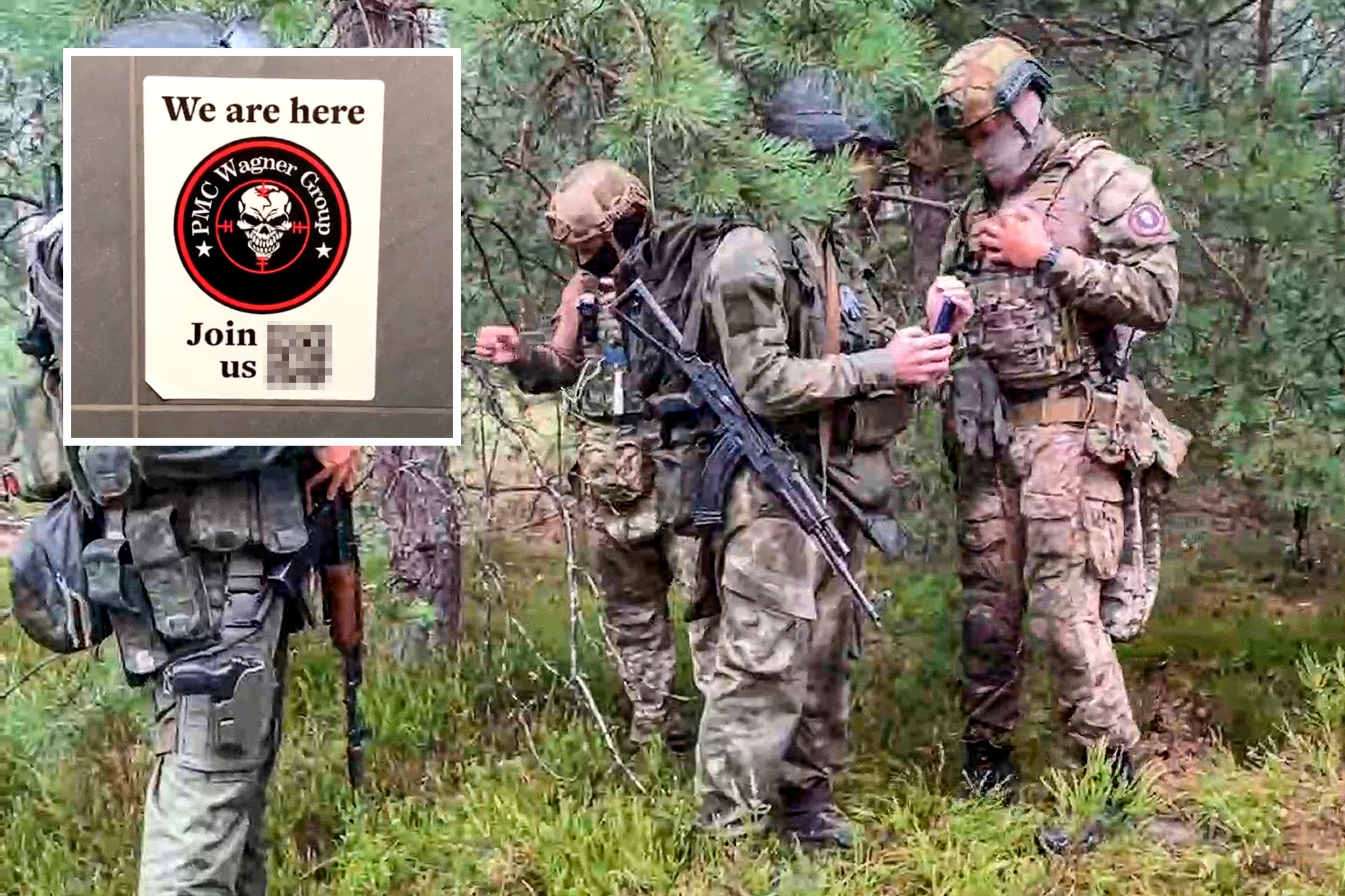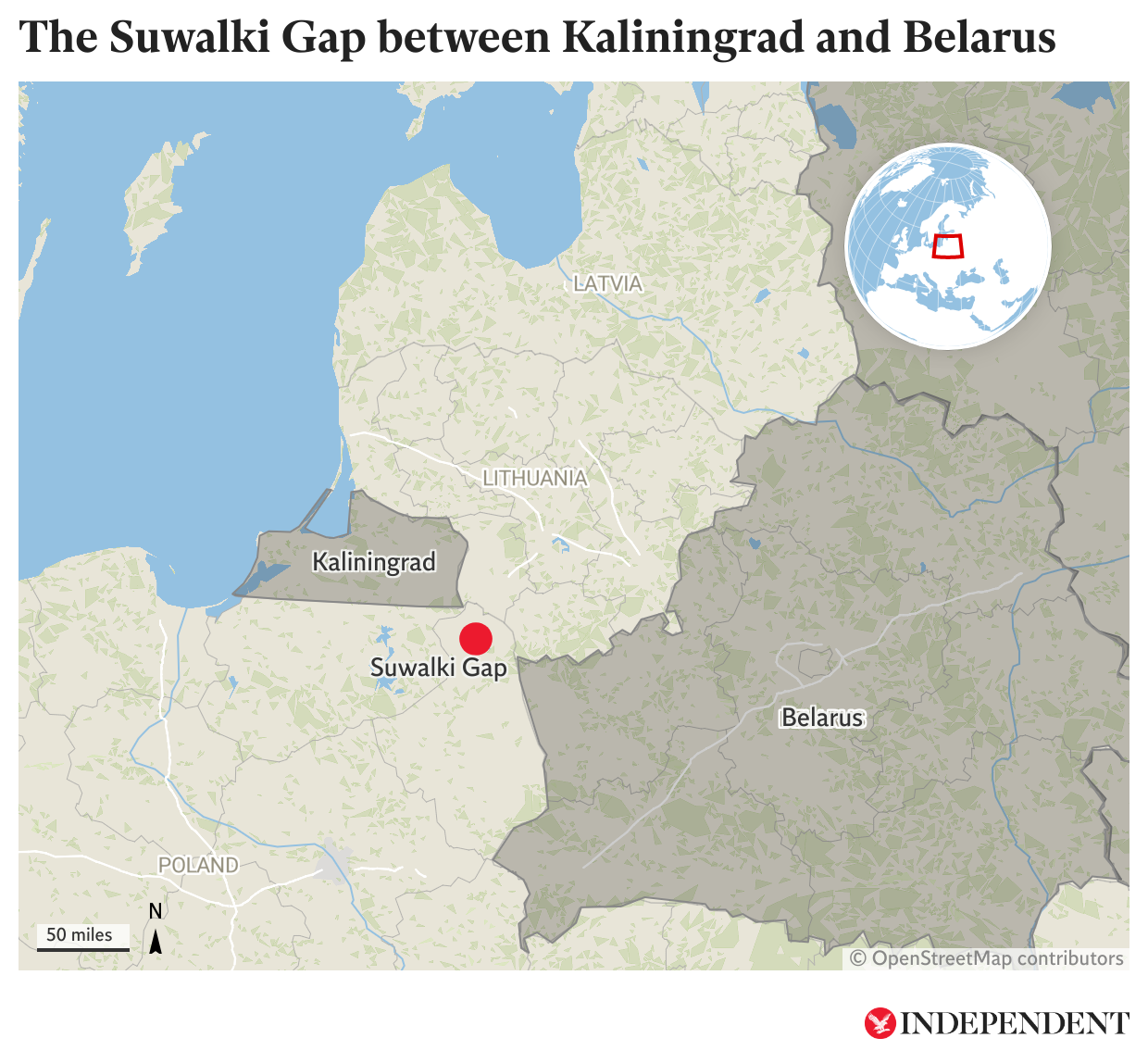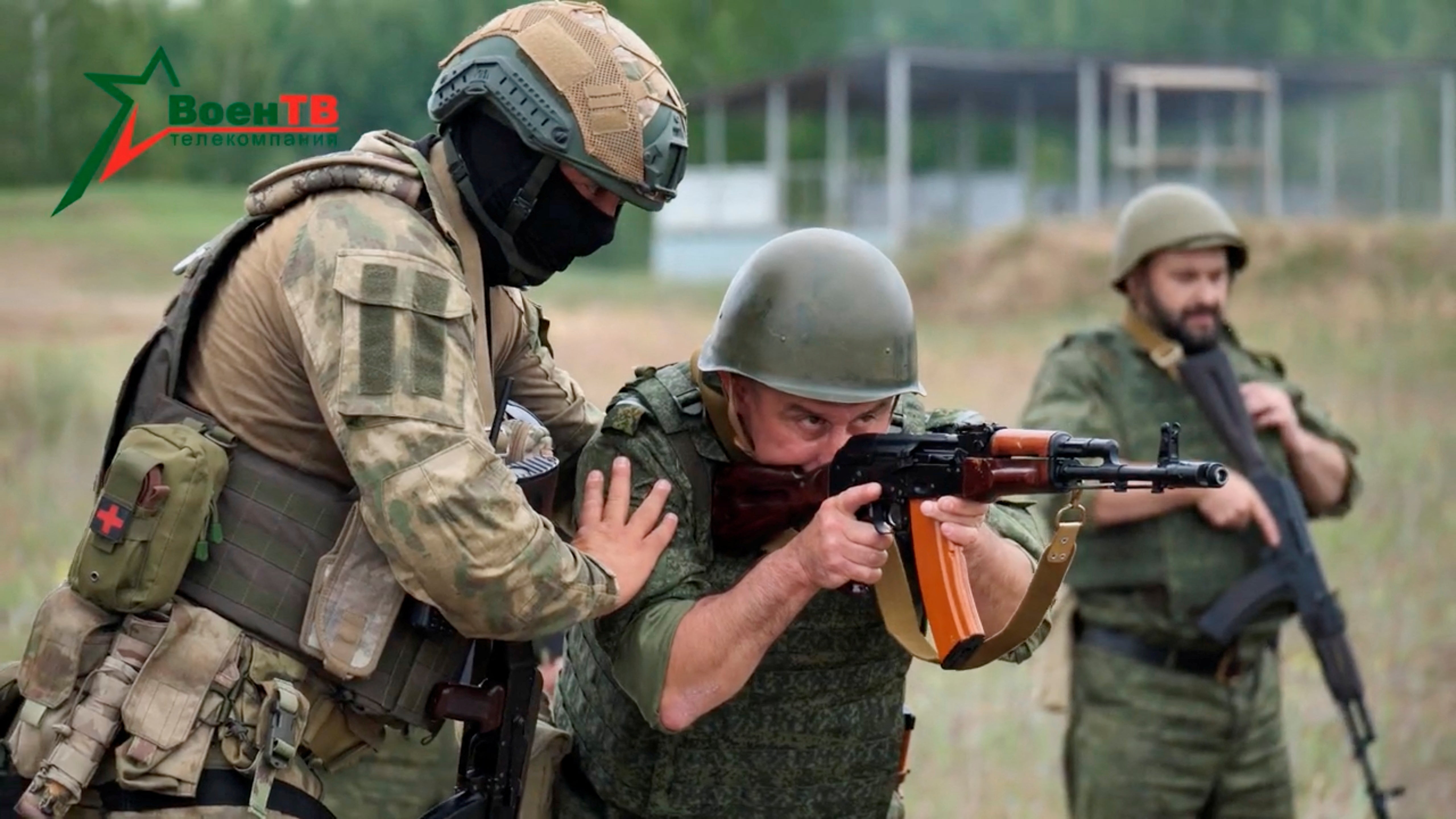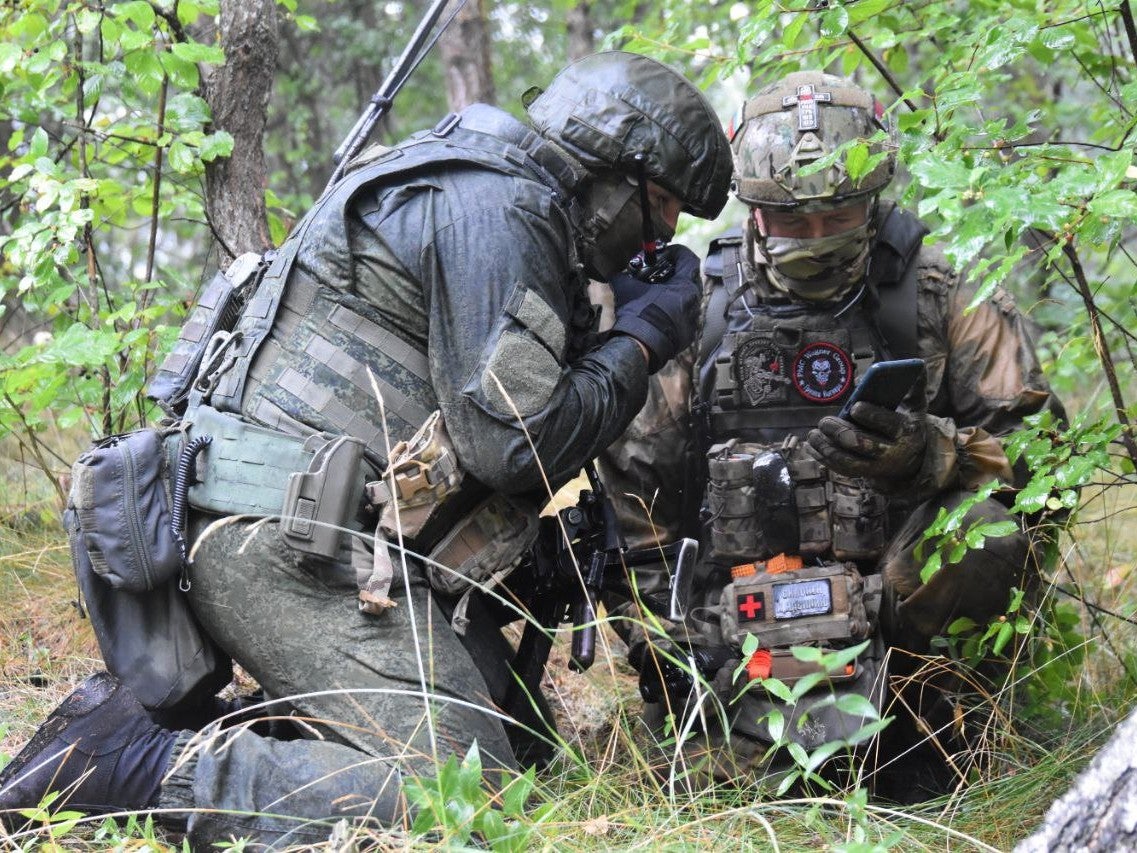Wagner mercenaries issue a chilling message on Poland’s doorstep: ‘We are here’
Warsaw is sending 10,000 troops to its border with Belarus, with the mercenary group setting up camp and recruitment posters appearing announcing their presence. Kim Sengupta reports from the Suwalki Gap in Poland, a key spot in Nato’s defence of Europe, as provocations from Russia and Belarus also ramp up


Thousands of battled-hardened Wagner fighters arrived in Belarus under a deal ending the attempted coup against Vladimir Putin by the group’s chief Yevgeny Prigozhin. No one thought that we had seen the last of them.
The mercenaries have moved towards the city of Grdno, according to the Polish military, and set up camp in the Brestsky area around six miles (10km) from Poland’s border.
And now, in a menacing turn, posters have begun to appear stuck next to Polish border posts with pictures of the fighters holding up signs in English saying “We are here. PMC [private military company] Wagner Group: Join us” with a QR code for would-be recruits. They have also appeared in Warsaw and Krakow. Poland’s interior minister Mariusz Kaminski said two Russians have been arrested over the matter.
Krakow is popular with British and other Western holidaymakers. Videos are circulating on social media of the poster being torn down by local people. Lukasz Wantuch, a councillor in Krakow, who published one of the photos said: “This is a provocation and this is happening here in Krakow”. Pyotr Komorowski, a student, said: “The aim is obvious, to scare tourists. That’s why they need to be removed quickly”.
In response to large-scale Belarusian military drills, also involving Wagner, Poland has announced that 10,000 extra troops are being deployed to its border. This has now been followed by Lithuania announcing that it is immediately closing two of its six border crossing points with Belarus due to developing “geopolitical circumstances”.
Adding to this combustible scenario is the Suwałki Gap, a crucial point in the West’s military strategy for the defence of Europe. A Russian breakthrough in the 60-mile corridor would result in the Baltic states being effectively cut off from the rest of the Nato alliance and encircled by hostile forces.
This highly sensitive area – on the Polish-Lithuania border wedged between the Russian exclave of Kaliningrad and Moscow-allied Belarus – is now a key factor in rising tensions as the Ukraine war continues to rage.

Warsaw has claimed that its airspace has been infringed by Belarusian military helicopters. Minsk denies this. But residents in the town of Bialowieza have provided photographs of a Mi-8 and Mi-24 aircraft with Belarusian markings which they say flew over their homes.
Polish prime minister Mateusz Morawiecki and the Lithuanian president Gitanas Nauseda met recently in Suwałki to discuss what they see as a very real threat. The Russian exclave of Kaliningrad has a significant military presence including nuclear-capable Iskander missiles.
Moscow had 12,000 infantry and airbourne troops in Kaliningrad and another 18,000 near the Baltic and Finnish borders. Some of these have been redeployed for operations in Ukraine, but Russia’s defence minister, Sergei Shoigu, has announced that the region would be reinforced to counter “Polish militarisation”.
Mr Nauseda pointed out: “Some Wagner fighters are close to our border which means that this situation is very convenient for provocations both on the Polish-Belarusian and Lithuanian-Belarusian borders... According to our data, there are about 4,000 mercenaries in Belarus maybe a bit more.”

Belarusian president Aleksandr Lukasehenko, who arranged the deal between Vladimir Putin and Wagner boss Yevgeny Prigozhin which ended the mercenary mutiny, has mockingly asked for Poland’s gratitude for keeping Wagner fighters in his country in check.
“They should pray that we are holding them and providing for them. Otherwise, without us, they would have seeped through and smashed up Rzeszow and Warsaw in no small way. So they shouldn’t reproach me, they should thank me,” quipped Mr Lukashenko.
The Belarus president has also claimed it is Poland that was trying to ratchet up confrontation. The main reason, he said, was for the government in Warsaw “to show that they have properly armed and rearmed the country” in the run-up to “ the [parliamentary elections] in October”.

On Tuesday, Poland showed off its armed muscle, displaying recently-acquired advanced weaponry in its biggest military parade in decades. “The defence of our eastern border, the border of the European Union and of Nato is today a key element of Poland's state interest,” declared President Andrzej Duda.
A senior Polish defence official said of the drills by Belarus: “The exercises being carried out are not for show, they are proper military drills. There is no reason for Wagner members to be so close to the border. We are seeing a pattern of behaviour which shows hostile intent. That is the reason we’re reinforcing the border. As the Russian aggression [in Ukraine] and also the Wagner rebellion in Russia showed, there are a lot of dangerous uncertainties. Our Nato allies agree with that.”
The Polish government maintains that the Wagner fighters may be used not just militarily by Belarus, but to try and destabilise Poland and Baltic states by trying to push refugees and asylum seekers across the border, as has happened periodically in the past.

The deputy foreign minister, Pavel Jablonski, said: “We are seeing illegal immigrants, mainly from Middle-Eastern countries, being flown from Moscow to Minsk and then in organised groups being transported to our borders and border with Lithuania also with Latvia. We are seeing increased numbers now, especially against Poland, at our borders because they want to destabilise our country ahead of our elections. That is their game plan.”
Tomasz Praga, the head of the Polish border guard force, reported that 19,000 migrants have tried to enter Poland from Belarus this year, compared to 16,000 in the whole of 2022. More than 4,000 tried to cross last month alone. “Of course what is happening is criminal as well as political, they are making huge profits from this,” he commented.
The residents of Suwałki, a pleasant city with the Czarna Hancza river (the most beautiful in Poland according to the local tourist board) running through an adjacent national park had become used to being on the frontline during the Cold War. The situation became more relaxed after the end of the Soviet Union and the era of détente – with tourists from neighbouring countries, including Russia, visiting.

But there was great apprehension after the start of the Ukraine war. Bomb shelters were organised in designated public buildings and air-raid alarms tested for the population of 70,000. Neighbourhoods formed volunteer groups. Some families made arrangements to move out to safer areas.
“Fortunately nothing happened. But there was always a worry and that has now got worse. The Belarus military are practising; practising for what? You can hear the big bangs near the border.” said resident Viktoria Lewandoska. “Now we are hearing about these Wagner people, we had not really heard about them before. But what we now hear does not sound good.”
Iryna Novak, who like her friend Viktoria had lived in Suwałki most of her adult life, added “We now have a lot more Polish forces coming here with all the military in Belarus. They are here to protect us and that is good. There is a lot of talk about this, on television and radio, social media and it makes people uneasy.”
The nature of the adversaries on the other side of the frontier is a source of concern for some
“These Wagner guys seem to be a bit unstable. Perhaps you need to be to try and carry out a coup against Putin”, said Tomasz Kozlowski, a retired businessman. “I have been following what they have been doing in Ukraine and it sounds terrible, killings, torture, what they did to women to children. I have a family and grandchildren. It is not a comfortable feeling that people like that are near us now.”
Join our commenting forum
Join thought-provoking conversations, follow other Independent readers and see their replies
Comments
Bookmark popover
Removed from bookmarks